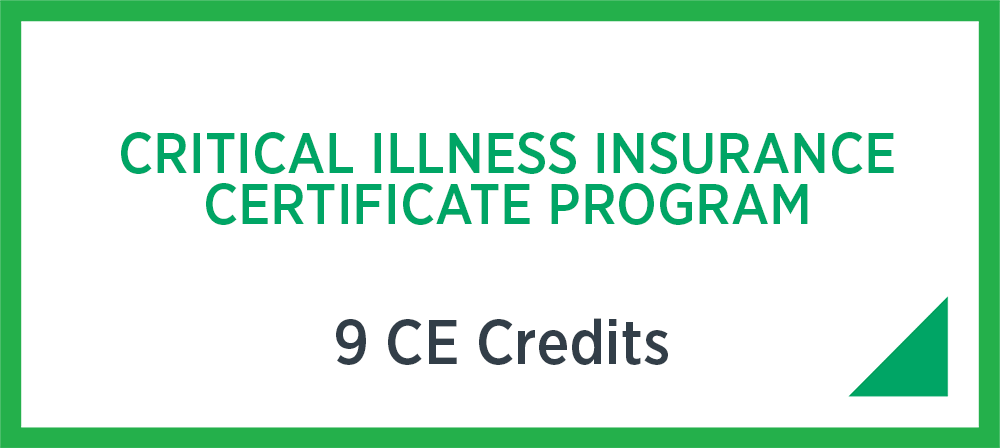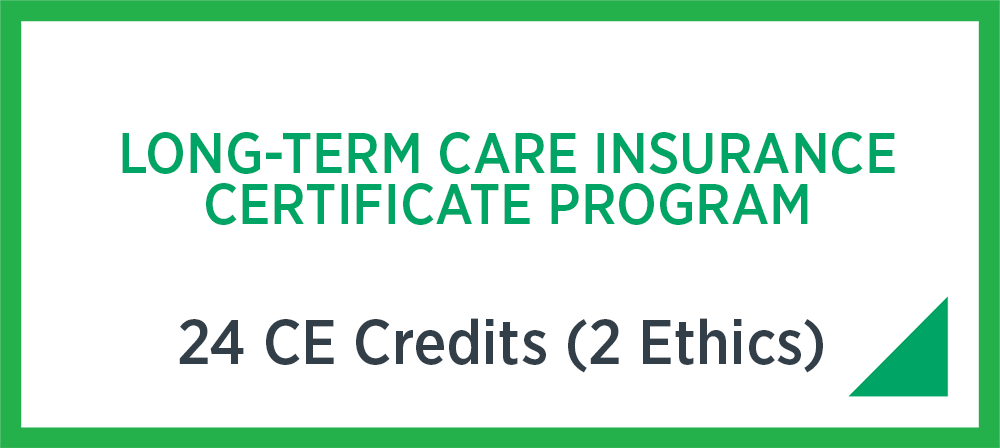- Advocacy
- Education
- Chapters
- Membership
- FORUM
- Find an Advisor
- About Us
Continuing Education – Product Matters
Continuing Education – Product Matters
Whether your practice is flourishing or you’re striving to stay at the forefront, our industry leading product-focused modules are your gateway to expansion and excellence in client services.
In an industry marked by constant innovation and evolving client expectations, staying on top of product developments is key to maintaining a competitive edge and ensuring enduring success in the ever-changing financial advice landscape.
Certificate Programs
Elevate your career, mitigate risks, and safeguard your professional future with our Insurance Certificate Programs — where knowledge meets success.
Insurance CE Modules
Stay at the forefront of the financial services industry by deepening your understanding of essential insurance products and best practices.
Essentials Series CE Modules
Our Essentials series of CE modules will deepen your understanding of life insurance transfers and buy sells to help keep your clients as prepared as possible.
Critical Illness Insurance
Critical Illness Insurance Certificate Program
$
90
+ applicable taxes for Advocis Members.
Non members pay $153 + applicable taxes.
Non members pay $153 + applicable taxes.
-
Understand the unique features of the CI product
-
One-year window for completion of the Certificate Program
-
Unlimited quiz attempts
Critical Illness Insurance Certificate Program
Full Program - 9 CE Credits
This certificate program introduces financial advisors to the valuable role critical illness insurance can play in a client’s financial plan. Ensuring your clients are aware of critical illness insurance is a clear demonstration of the value of advice you provide. Regardless of whether or not your clients purchase critical illness insurance, they need to be properly informed about it.
The Critical Illness Insurance Certificate program will not only introduce you to how this innovative product addresses your client’s risk of suffering a significant illness, but it will also help you fully understand the product, including its unique underwriting requirements and how to position it with your clients.
The component modules of the Critical Illness Insurance Certificate Program can also be registered for and completed individually.
Module 1: Product Design & Marketing
$
50
+ applicable taxes for Advocis Members.
Non members pay $75 + applicable taxes.
Non members pay $75 + applicable taxes.
-
Understanding how an analysis helps identify a client’s needs and fits into an overall plan
-
One-year window for completion of the module
-
Unlimited quiz attempts
Critical Illness Insurance Certificate Program
Module 1: Product Design & Marketing - 4 CE Credits
Critical Illness (CI) insurance product design and marketing addresses the unique features of the CI product that will appeal to the consumer, and compares strategies used for CI to those used for Disability Income and Life Insurance. Learning objectives include understanding how an analysis helps identify a client’s needs, the importance of communicating the policy provisions and the conditions for a successful claim, and where CI insurance fits into an overall plan.
Module 2: Plans, Options & Provisions
$
40
+ applicable taxes for Advocis Members.
Non members pay $60 + applicable taxes.
Non members pay $60 + applicable taxes.
-
Explain definitions and the key features to compare when selecting the CI product
-
One-year window for completion of the module
-
Unlimited quiz attempts
Critical Illness Insurance Certificate Program
Module 2: Plans, Options & Provisions - 3 CE Credits
Through a review of various critical illness insurance plans, this module provides an overview of the features of each type of CI plan with special attention given to optional benefits such as Return of Premium on Death (ROPD). General exclusions and limitations are described that are important to understand for the practitioner and the client.
Module 3: Underwriting & Claims
$
30
+ applicable taxes for Advocis Members.
Non members pay $45 + applicable taxes.
Non members pay $45 + applicable taxes.
-
Identify the key health conditions and their concerns from a CI underwriting perspective
-
One-year window for completion of the module
-
Unlimited quiz attempts
Critical Illness Insurance Certificate Program
Module 3: Underwriting & Claims - 2 CE Credits
This module addresses the special underwriting considerations for CI insurance considering that the insurance coverage is for critical illnesses such as cancer, heart attacks and strokes. The module also looks at the unique nature of CI claims adjudication.
Disability Income Insurance
Disability Income Insurance Certificate Program
$
390
+ applicable taxes for Advocis Members.
Non members pay $663 + applicable taxes.
Non members pay $663 + applicable taxes.
-
Understand the unique moral, physical, and legal hazards associated with DI and the impact of stability and motivation on claims
-
One-year window for completion of the Certificate Program
-
Unlimited quiz attempts
Disability Income Insurance Certificate Program
Full Program - 38 CE Credits
When the risk of income loss due to illness or injury isn’t considered, even the best financial planning can quickly unravel.
The Disability Income Insurance Certificate program will equip you with an understanding of disability risks, the level of earned income that can be protected, and sources of income that can be relied on during a disability. In addition to an in-depth review of the common disability income insurance provisions and claims administration, this program will also cover special products for business needs and unique circumstances, such as medical and travel insurance.
The component modules of the Disability Income Insurance Certificate Program can also be registered for and completed individually.
Module 1: Examining Risk
$
50
+ applicable taxes for Advocis Members.
Non members pay $75 + applicable taxes.
Non members pay $75 + applicable taxes.
-
Learn the basics of interpreting and using statistics in order to support opinions with facts
-
One-year window for completion of the module
-
Unlimited quiz attempts
Disability Income Insurance Certificate Program
Module 1: Examining Risk - 4 CE Credits
This module examines the origin of Disability Income insurance, its evolution, and the special nature of the risks it covers. This module also reviews the concept of living benefits as a full spectrum of health products, representing the insurance industry’s response to societal shifts in employment over the past two decades.
Module 2: Needs Analysis
$
40
+ applicable taxes for Advocis Members.
Non members pay $60 + applicable taxes.
Non members pay $60 + applicable taxes.
-
Identify and perform the various stages of preparing a client presentation
-
One-year window for completion of the module
-
Unlimited quiz attempts
Disability Income Insurance Certificate Program
Module 2: Needs Analysis - 3 CE Credits
Beginning with a review of the client’s DI insurance needs, this module goes through each stage of the plan design process in detail. Areas covered include how to choose a policy best suited for the client’s needs, how soon benefits should begin, how long benefits should be payable for a claim, amount of coverage required, and additional features to be included in the plan.
Module 3: Determining the Benefit
$
50
+ applicable taxes for Advocis Members.
Non members pay $75 + applicable taxes.
Non members pay $75 + applicable taxes.
-
Identify existing sources of a client’s income should that client become disabled
-
One-year window for completion of the module
-
Unlimited quiz attempts
Disability Income Insurance Certificate Program
Module 3: Determining the Benefit - 4 CE Credits
After learning how to fill the income gap in the absence of disability insurance, non–insured sources of income, government sources and group LTD, this module reviews types of income such as bonuses, commissions, dividends, executive perks, and spousal income splitting, and looks at the impact of unearned income and net worth on insurable earnings.
Module 4: Policy Provisions
$
60
+ applicable taxes for Advocis Members.
Non members pay $90 + applicable taxes.
Non members pay $90 + applicable taxes.
-
Identify, analyze and explain the provisions that commonly appear in a typical disability income policy
-
One-year window for completion of the module
-
Unlimited quiz attempts
Disability Income Insurance Certificate Program
Module 4: Policy Provisions - 5 CE Credits
With a focus on income policies typically sold in traditional markets, this module examines provisions in a disability income policy, including the differences between non-cancellable, guaranteed renewable, conditionally renewable and cancellable policies. The module also looks at the features and requirements of both the occupational and the earnings approach to defining disability.
Module 5: Contract Workers
$
30
+ applicable taxes for Advocis Members.
Non members pay $45 + applicable taxes.
Non members pay $45 + applicable taxes.
-
Identify, analyze and explain the most common provisions in disability income policies typically sold to contract workers
-
One-year window for completion of the module
-
Unlimited quiz attempts
Disability Income Insurance Certificate Program
Module 5: Contract Workers - 2 CE Credits
Through a review of the changing workforce, this module examines product developments that have made disability income insurance more accessible. The module also looks at the growing demand of DI insurance coverage for non-traditional workers.
Module 6: Wage Loss Replacement
$
30
+ applicable taxes for Advocis Members.
Non members pay $45 + applicable taxes.
Non members pay $45 + applicable taxes.
-
Identify and explain wage loss replacement plans including their tax implications
-
One-year window for completion of the module
-
Unlimited quiz attempts
Disability Income Insurance Certificate Program
Module 6: Wage Loss Replacement - 2 CE Credits
An overview of various workplace solutions for wage loss replacement. Topics covered include the use of individual DI and the concept of grouping, as well as wage loss replacement plans, dealing with existing group LTD, additions and alternatives to group LTD, and guaranteed issue plans.
Module 7: Small Business Owners
$
40
+ applicable taxes for Advocis Members.
Non members pay $60 + applicable taxes.
Non members pay $60 + applicable taxes.
-
Explain to your client the features of each type of business coverage
-
One-year window for completion of the module
-
Unlimited quiz attempts
Disability Income Insurance Certificate Program
Module 7: Small Business Owners - 3 CE Credits
An examination of disability buy-sell insurance, key person insurance, overhead expense insurance and business loan protection policies, including their features, benefits, and taxation.
Module 8: Underwriting & Claims
$
70
+ applicable taxes for Advocis Members.
Non members pay $105 + applicable taxes.
Non members pay $105 + applicable taxes.
-
Identify and perform the steps associated with classifying occupations and preparing the client and application for head office underwriting
-
One-year window for completion of the module
-
Unlimited quiz attempts
Disability Income Insurance Certificate Program
Module 8: Underwriting & Claims - 6 CE Credits
Through a review of DI policy underwriting, this module looks at the advisor’s role in field underwriting and the head office underwriter’s role in risk assessment. Risk assessment is analyzed from an occupational, medical, financial, and lifestyle risk perspective. Additional considerations include the DI claims process, the role of the benefits adjudicator, the role of the advisor, and managing expectations.
Module 9: Health & Travel Insurance
$
70
+ applicable taxes for Advocis Members.
Non members pay $105 + applicable taxes.
Non members pay $105 + applicable taxes.
-
Understanding of the public health insurance system and benefits that clients may be eligible for
-
One-year window for completion of the module
-
Unlimited quiz attempts
Disability Income Insurance Certificate Program
Module 9: Health & Travel Insurance - 6 CE Credits
An examination of the public health insurance system, the health care delivery system, veterans’ benefits and workers’ compensation insurance. The module also covers the two major categories of travel insurance: individual emergency medical insurance for outbound Canadians and emergency medical insurance for visitors to Canada.
Module 10: Specialty Risk Markets
$
40
+ applicable taxes for Advocis Members.
Non members pay $60 + applicable taxes.
Non members pay $60 + applicable taxes.
-
Identify situations that require the use of a special risk disability product
-
One-year window for completion of the module
-
Unlimited quiz attempts
Disability Income Insurance Certificate Program
Module 10: Specialty Risk Markets - 3 CE Credits
A close inspection of situations where traditional disability income insurance is not a viable solution, and examines the special risk market relative to the need, risk management tools and techniques used in this market, as well as the advisor’s perspective. The module also covers mortgage creditor insurance and private mortgage insurance.
Group Insurance
Group Insurance Certificate Program
$
405
+ applicable taxes for Advocis Members.
Non members pay $688.50 + applicable taxes.
Non members pay $688.50 + applicable taxes.
-
Understand the full range of group benefit coverages and plans for employee groups
-
One-year window for completion of the Certificate Program
-
Unlimited quiz attempts
Group Insurance Certificate Program
Full Program - 37 CE Credits
Is one of your practice goals to expand and establish a link to the group insurance business? Are you currently leaving a lucrative group insurance opportunity on the table? If so, this certificate program is for you.
Through the Group Insurance Certificate program, you will gain an understanding of the full range of group benefit coverages and plans for employee groups. You will also learn about plan funding, administration, and special marketing protocols, as well as the underwriting and claims processes of group benefit plan management.
The component modules of the Group Insurance Certificate Program can also be registered for and completed individually.
Module 1: Addressing Risk
$
30
+ applicable taxes for Advocis Members.
Non members pay $45 + applicable taxes.
Non members pay $45 + applicable taxes.
-
Understand and explain the concept of risk management and risk management techniques
-
One-year window for completion of the module
-
Unlimited quiz attempts
Group Insurance Certificate Program
Module 1: Addressing Risk - 2 CE Credits
Following an introduction to group insurance, underwriting methods and insurable groups, this module addresses the issues of risk and the uncertainty of financial loss, with a focus on pure risk.
Module 2: Benefit Plan Management
$
40
+ applicable taxes for Advocis Members.
Non members pay $60 + applicable taxes.
Non members pay $60 + applicable taxes.
-
Understand the fundamental principles of group insurance in determining those eligible for group insurance coverage
-
One-year window for completion of the module
-
Unlimited quiz attempts
Group Insurance Certificate Program
Module 2: Benefit Plan Management - 3 CE Credits
Employers or other sanctioned organizations offer benefit coverage and plans to various groups including single-employer plans, multi-employer plans, association plans and creditor plans. This module also addresses the key participants and features for group benefit plans.
Module 3: Plan Design & Funding
$
50
+ applicable taxes for Advocis Members.
Non members pay $75 + applicable taxes.
Non members pay $75 + applicable taxes.
-
Describe the design steps in developing a new group plan or revising an existing plan
-
One-year window for completion of the module
-
Unlimited quiz attempts
Group Insurance Certificate Program
Module 3: Plan Design & Funding - 4 CE Credits
This module compares group insurance and individual insurance, with a focus on the benefits of group insurance. This module also provides a general overview of the key funding methods and factors that impact the options for managing the associated financial risk or liability.
Module 4: Plan Administration
$
40
+ applicable taxes for Advocis Members.
Non members pay $60 + applicable taxes.
Non members pay $60 + applicable taxes.
-
Understand the features and differences of administrative approaches including self-administration, insurer administration and Third Party Administration (TPA)
-
One-year window for completion of the module
-
Unlimited quiz attempts
Group Insurance Certificate Program
Module 4: Plan Administration - 3 CE Credits
Benefit plan administration includes a wide range of tasks that vary depending on whether the plan is new, established or undergoing changes. This module focuses on basic administrative activities and various approaches for carrying them out.
Module 5: Claims Administration
$
40
+ applicable taxes for Advocis Members.
Non members pay $60 + applicable taxes.
Non members pay $60 + applicable taxes.
-
Understand the role of the claims analyst
-
One-year window for completion of the module
-
Unlimited quiz attempts
Group Insurance Certificate Program
Module 5: Claims Administration - 3 CE Credits
Following an introduction to group insurance, underwriting methods and insurable groups, this module addresses the issues of risk and the uncertainty of financial loss, with a focus on pure risk.
This module provides a description of the process and considerations for health care, dental care and disability claims submissions, and explains the role of the claims analyst, with emphasis on the timely and accurate payment of claims.
Module 6: Underwriting
$
50
+ applicable taxes for Advocis Members.
Non members pay $75 + applicable taxes.
Non members pay $75 + applicable taxes.
-
Understand the underwriting process for pricing group insurance products
-
One-year window for completion of the module
-
Unlimited quiz attempts
Group Insurance Certificate Program
Module 6: Underwriting - 4 CE Credits
A detailed discussion on how group insurance is priced, factors considered in pricing, and the types of claims considered. In each case, the cost of the claim incurred, claims paid, and reserves are related as critical parts of the pricing process. Plan expenses, plan design and group characteristics are also identified as integral parts of pricing.
Module 7: Disability Income Replacement
$
50
+ applicable taxes for Advocis Members.
Non members pay $75 + applicable taxes.
Non members pay $75 + applicable taxes.
-
Understand the meaning of sick leave, salary continuance and weekly indemnity plans
-
One-year window for completion of the module
-
Unlimited quiz attempts
Group Insurance Certificate Program
Module 7: Disability Income Replacement - 4 CE Credits
An in-depth review of group insurance income replacement plans, which protect employees against loss of income in the event of a short-term disability. Topics covered include design, funding and administration for various types of plans, accounting requirements, managing employee absence, and the cost of providing benefits.
Module 8: Extended Health Care Benefits
$
40
+ applicable taxes for Advocis Members.
Non members pay $60 + applicable taxes.
Non members pay $60 + applicable taxes.
-
Understand the types of benefits offered under extended health care plans
-
One-year window for completion of the module
-
Unlimited quiz attempts
Group Insurance Certificate Program
Module 8: Extended Health Care Benefits - 3 CE Credits
A review of the services offered under extended health care plans. This module addresses plan design and administration of extended health care plans, as well as special features such as deductibles, co-insurance, benefit maximums, customary charges and covered expenses.
Module 9: Dental Coverage
$
30
+ applicable taxes for Advocis Members.
Non members pay $45 + applicable taxes.
Non members pay $45 + applicable taxes.
-
Understand the types of benefits offered under dental care plans from basic care, major restorative care and orthodontic services
-
One-year window for completion of the module
-
Unlimited quiz attempts
Group Insurance Certificate Program
Module 9: Dental Coverage - 2 CE Credits
An overview of the services offered under dental care plans. For group insurance purposes, dental care services are generally grouped into basic or routine care, major restorative and orthodontic services.
Module 10: Wellness Programs
$
30
+ applicable taxes for Advocis Members.
Non members pay $45 + applicable taxes.
Non members pay $45 + applicable taxes.
-
Understand the role of EAPs in providing services to improve an employee’s well-being and productivity
-
One-year window for completion of the module
-
Unlimited quiz attempts
Group Insurance Certificate Program
Module 10: Wellness Programs - 2 CE Credits
With a focus on the design, administration, taxation and funding considerations of Employee Assistance Programs and wellness programs, this module discusses the ancillary benefits employers might provide such as family benefits, financial benefits, and group legal insurance.
Module 11: Flexible Benefit Plans
$
50
+ applicable taxes for Advocis Members.
Non members pay $75 + applicable taxes.
Non members pay $75 + applicable taxes.
-
Learn the types of approaches enlisted to introduce flexibility to group benefit plans
-
One-year window for completion of the module
-
Unlimited quiz attempts
Group Insurance Certificate Program
Module 11: Flexible Benefit Plans - 4 CE Credits
In flexible benefits plans, the employees decide how employer benefit dollars are spent on their behalf. This module addresses the services and limits offered under flexible benefit plans, various approaches for introducing flexibility, and the pricing and credit structure of the plan.
Module 12: Insurance Marketing
$
40
+ applicable taxes for Advocis Members.
Non members pay $60 + applicable taxes.
Non members pay $60 + applicable taxes.
-
Understand the special meaning of marketing in the group insurance arena
-
One-year window for completion of the module
-
Unlimited quiz attempts
Group Insurance Certificate Program
Module 12: Insurance Marketing - 3 CE Credits
A review of the processes involved in group insurance marketing. This module also defines the roles intermediaries such as agents, brokers, consultants, and account executives play in the marketing process.
Long-Term Care Insurance
Long-Term Care Insurance Certificate Program
$
232
Non members pay $395.25 + applicable taxes.
50
+ applicable taxes for Advocis Members.Non members pay $395.25 + applicable taxes.
-
Identify and explain why population aging is occurring, how it impacts our healthcare system and the implications for clients
-
One-year window for completion of the Certificate Program
-
Unlimited quiz attempts
Long-Term Care Insurance Certificate Program
Full Program - 24 CE Credits Including 2 Ethics Credits
With a rapidly aging demographic in Canada, there is an urgent challenge to meet the health and personal-care needs of this growing segment of our population. The Long-Term Care Certificate program is designed to help financial advisors rise to this task by preparing their clients to consider and plan for their long-term care needs.
This certificate program provides an understanding of the design and structure of current long-term care insurance plans and explores the chronic conditions many seniors experience, the costs of continuing care, and the various government programs available so that you can adequately assess your client’s risk of not being able to afford proper care.
The component modules of the Long-Term Care Insurance Certificate Program can also be registered for and completed individually.
Module 1: Senior Care in Canada
$
40
+ applicable taxes for Advocis Members.
Non members pay $60 + applicable taxes.
Non members pay $60 + applicable taxes.
-
Identify and explain social issues associated with aging and understand how these issues impact older clients
-
One-year window for completion of the module
-
Unlimited quiz attempts
Long-Term Care Insurance Certificate Program
Module 1: Senior Care in Canada - 3 CE Credits
In this module, you will learn to identify and explain why population aging is occurring, how it impacts our healthcare system and the implications for clients. You will also be introduced to seven critical issues being addressed in Canada’s health care system within the framework of long-term care insurance.
Module 2: Caring for Older Adults
$
60
+ applicable taxes for Advocis Members.
Non members pay $90 + applicable taxes.
Non members pay $90 + applicable taxes.
-
Identify and explain end of life issues
-
One-year window for completion of the module
-
Unlimited quiz attempts
Long-Term Care Insurance Certificate Program
Module 2: Caring for Older Adults - 5 CE Credits Including 1 Ethics Credit
This module considers the social factors affecting seniors include discrimination and ageism as well as ethics in marketing to seniors. Aging and health concerns are examined with the difference between normal aging and unhealthy aging. Major health conditions that affect older adults and how they should prepare in advance for a medical emergency are considered.
Module 3: Needs Analysis for Seniors
$
50
+ applicable taxes for Advocis Members.
Non members pay $75 + applicable taxes.
Non members pay $75 + applicable taxes.
-
Identify and explain the difference between normal aging and unhealthy aging
-
One-year window for completion of the module
-
Unlimited quiz attempts
Long-Term Care Insurance Certificate Program
Module 3: Needs Analysis for Seniors - 4 CE Credits
This offering examines aging and health concerns, and differentiates between normal aging and unhealthy aging. This module also reviews the major health conditions that affect older adults and how they should prepare for a medical emergency.
Module 4: Senior Care Alternatives
$
50
+ applicable taxes for Advocis Members.
Non members pay $75 + applicable taxes.
Non members pay $75 + applicable taxes.
-
Explain home care and residential care options, how the need is determined, how to select appropriate care, and how to obtain the services
-
One-year window for completion of the module
-
Unlimited quiz attempts
Long-Term Care Insurance Certificate Program
Module 4: Senior Care Alternatives - 4 CE Credits
This module addresses government care programs, which are delivered through each province’s Ministry of Health. Topics discussed include the factors that influence care options such as unique housing needs, the need for home care or community care, the need for respite for the caregiver and the support of a care manager.
Module 5: Planning Techniques for Seniors
$
30
+ applicable taxes for Advocis Members.
Non members pay $45 + applicable taxes.
Non members pay $45 + applicable taxes.
-
Learn the key planning topics for discussion between adult children and their parents
-
One-year window for completion of the module
-
Unlimited quiz attempts
Long-Term Care Insurance Certificate Program
Module 5: Planning Techniques for Seniors - 4 CE Credits Including 1 Ethics Credit
This module considers how the needs of the insured will change over time, and how benefits under the LTC policy should reflect those changes. This module also considers the special way in which seniors respond to communication.
Module 6: Underwriting & Claims
$
30
+ applicable taxes for Advocis Members.
Non members pay $45 + applicable taxes.
Non members pay $45 + applicable taxes.
-
Identify key differences between the LTC insurance risk and other forms of insurance risk
-
One-year window for completion of the module
-
Unlimited quiz attempts
Long-Term Care Insurance Certificate Program
Module 6: Underwriting & Claims - 2 CE Credits
A discussion of the underwriting process and the medical considerations that differentiate underwriting LTC insurance from underwriting DI or CI insurance.
Module 7: Products
$
30
+ applicable taxes for Advocis Members.
Non members pay $45 + applicable taxes.
Non members pay $45 + applicable taxes.
-
Learn the three main structures for long-term care (LTC) insurance and the hybrid versions that have evolved from them
-
One-year window for completion of the module
-
Unlimited quiz attempts
Long-Term Care Insurance Certificate Program
Module 7: Products - 2 CE Credits
An extensive consideration of various insurance policy structures such as the reimbursement-based, the indemnity-based and the income-based models. The module also reviews the two major types of benefits: home care benefits and facility benefits.
Insurance CE Modules
Introduction to Segregated Funds
$
120
+ applicable taxes for Advocis Members.
Non members pay $180 + applicable taxes.
Non members pay $180 + applicable taxes.
-
Learn the unique features of IVICs that distinguish them from other types of insurance products
-
One-month window for completion of the course
-
Unlimited quiz attempts
Introduction to Segregated Funds
11 CE Credits
With a focus on how segregated fund polices differentiate from other types of life insurance products, this module provides an understanding of the unique features of segregated fund policies. This module also reviews Individual Variable Insurance Contracts and their underlying segregated funds from several different perspectives, and seeks to provide a balanced view of their features, benefits and weaknesses in relation to other products available in the investment marketplace.
- Describe the unique features of IVICs that distinguish them from other types of insurance products
- Understand and explain the disclosure requirements imposed on the life insurance agent and the insurance company on the sale and ongoing administration of an IVIC
Format: Online learning & quiz
Pre-requisites: None
CE Credits: 11 CE
Note: Please check with your jurisdiction, designating body or professional association regarding their CE requirements.
Additional Material: None
Completion Requirements:
- Passing mark is 60%
- Completion of one online quiz (100% of overall mark)
- 24/7 access to the Advocis Learning Centre
- One-month window for completion
- Unlimited quiz attempts
- Download content
- Access to help for module-related questions
- ReadSpeaker text-to-speech
- Self-study: The Advocis online modules are designed as self-study, with success highly dependent on the student’s personal discipline. Students are presented with learning content and a quiz to assess their overall understanding.
Members: $120.00 plus shipping & taxes
Non-members: $180.00 plus shipping & taxes
Administrative Policies:
- All purchases are non-refundable
- There are no cancellations or extensions
- Expiry date is 30 days after registration
- Allow for 1-2 business days to access the module following the registration and payment process
Life Insurance Products
$
110
+ applicable taxes for Advocis Members.
Non members pay $165 + applicable taxes.
Non members pay $165 + applicable taxes.
-
Identify and describe the various life, health and annuity products available
-
One-month window for completion of the course
-
Unlimited quiz attempts
Life Insurance Products
10 CE Credits
An introduction to one of the most important products for providing life insurance protection to individuals and business owners. This module positions life insurance products among the various insurance products that address the risk of living too long, dying too soon, and becoming disabled.
- Identify and describe the various life, health and annuity products available
- Select the most appropriate insurance product type, given specific circumstances
Format: Online learning & quiz
Pre-requisites: None
CE Credits: 10 CE, including
Note: Please check with your jurisdiction, designating body or professional association regarding their CE requirements.
Additional Material: None
Completion Requirements:
- Passing mark is 60%
- Completion of one online quiz (100% of overall mark)
- 24/7 access to the Advocis Learning Centre
- One-month window for completion
- Unlimited quiz attempts
- Download content
- Access to help for module-related questions
- ReadSpeaker text-to-speech
- Self-study: The Advocis online modules are designed as self-study, with success highly dependent on the student’s personal discipline. Students are presented with learning content and a quiz to assess their overall understanding.
Members: $110.00 plus shipping & taxes
Non-members: $165.00 plus shipping & taxes
Administrative Policies:
- All purchases are non-refundable
- There are no cancellations or extensions
- Expiry date is 30 days after registration
- Allow for 1-2 business days to access the module following the registration and payment process
Insurance Underwriting Process
$
50
+ applicable taxes for Advocis Members.
Non members pay $75 + applicable taxes.
Non members pay $75 + applicable taxes.
-
Understand the agent's role in working with the applicant to complete the application for insurance
-
One-month window for completion of the course
-
Unlimited quiz attempts
Insurance Underwriting Process
4 CE Credits
An overview of the underwriting process and the role the life insurance agent plays in that process. This module also looks at best practices in completing life insurance applications to ensure accuracy.
- Understand the agent’s role in working with the applicant to complete the application for insurance
- Consider the consequences of the agent’s failure to obtain complete and truthful information from the applicant
Format: Online learning & quiz
Pre-requisites: None
CE Credits: 4 CE
Note: Please check with your jurisdiction, designating body or professional association regarding their CE requirements.
Additional Material: None
Completion Requirements:
- Passing mark is 60%
- Completion of one online quiz (100% of overall mark)
- 24/7 access to the Advocis Learning Centre
- One-month window for completion
- Unlimited quiz attempts
- Download content
- Access to help for module-related questions
- ReadSpeaker text-to-speech
- Self-study: The Advocis online modules are designed as self-study, with success highly dependent on the student’s personal discipline. Students are presented with learning content and a quiz to assess their overall understanding.
Members: $50.00 plus shipping & taxes
Non-members: $75.00 plus shipping & taxes
Administrative Policies:
- All purchases are non-refundable
- There are no cancellations or extensions
- Expiry date is 30 days after registration
- Allow for 1-2 business days to access the module following the registration and payment process
Annuity Products & Applications
$
30
+ applicable taxes for Advocis Members.
Non members pay $45 + applicable taxes.
Non members pay $45 + applicable taxes.
-
Learn to describe the types of annuities available including life annuities and immediate and deferred annuities
-
One-month window for completion of the course
-
Unlimited quiz attempts
Annuity Products & Applications
2 CE Credits
This module focuses on understanding the basic structure of annuity contracts issued by insurance companies and describing the types of annuities available including life annuities, immediate and deferred annuities.
- Describe the types of annuities available including life annuities and immediate and deferred annuities
- Explain the factors that determine the costs and payment amounts of annuities
Format: Online learning & quiz
Pre-requisites: None
CE Credits: 2 CE
Note: Please check with your jurisdiction, designating body or professional association regarding their CE requirements.
Additional Material: None
Completion Requirements:
- Passing mark is 60%
- Completion of one online quiz (100% of overall mark)
- 24/7 access to the Advocis Learning Centre
- One-month window for completion
- Unlimited quiz attempts
- Download content
- Access to help for module-related questions
- ReadSpeaker text-to-speech
- Self-study: The Advocis online modules are designed as self-study, with success highly dependent on the student’s personal discipline. Students are presented with learning content and a quiz to assess their overall understanding.
Members: $30.00 plus shipping & taxes
Non-members: $45.00 plus shipping & taxes
Administrative Policies:
- All purchases are non-refundable
- There are no cancellations or extensions
- Expiry date is 30 days after registration
- Allow for 1-2 business days to access the module following the registration and payment process
Insurance Needs Analysis
$
70
+ applicable taxes for Advocis Members.
Non members pay $105 + applicable taxes.
Non members pay $105 + applicable taxes.
-
Understand risk management techniques to avoid, control, retain or transfer risk
-
One-month window for completion of the course
-
Unlimited quiz attempts
Insurance Needs Analysis
6 CE Credits
The services a life insurance agent can provide to a client to assist in determining the client’s financial needs and objectives are covered in this module. Insurance and risk management strategies are considered through a sample case study and financial plan.
- Understand risk management techniques to avoid, control, retain or transfer risk
- Understand the financial planner’s role and responsibilities in selling life insurance
Format: Online learning & quiz
Pre-requisites: None
CE Credits: 6 CE
Note: Please check with your jurisdiction, designating body or professional association regarding their CE requirements.
Additional Material: None
Completion Requirements:
- Passing mark is 60%
- Completion of one online quiz (100% of overall mark)
- 24/7 access to the Advocis Learning Centre
- One-month window for completion
- Unlimited quiz attempts
- Download content
- Access to help for module-related questions
- ReadSpeaker text-to-speech
- Self-study: The Advocis online modules are designed as self-study, with success highly dependent on the student’s personal discipline. Students are presented with learning content and a quiz to assess their overall understanding.
Members: $70.00 plus shipping & taxes
Non-members: $105.00 plus shipping & taxes
Administrative Policies:
- All purchases are non-refundable
- There are no cancellations or extensions
- Expiry date is 30 days after registration
- Allow for 1-2 business days to access the module following the registration and payment process
Essentials Series CE Modules
Essentials of Life Transfers Bundle
$
140
+ applicable taxes for Advocis Members.
Non members pay $210 + applicable taxes.
Non members pay $210 + applicable taxes.
-
Stay current on important tax rules and issues impacting life insurance transfers
-
One-month window for completion of the bundle
-
Unlimited quiz attempts
Essentials of Life Transfers Bundle
4 CE Credits
This course is a bundle of the two Essentials Life Transfer courses:
- Essentials of Family, Trust and Charitable Transfers & Essentials of Shareholder
- Corporate and Partnership Transfers
These courses will keep you up to date on important tax rules and issues impacting life insurance transfers.
Essentials of Family, Trust and Charitable Transfers
$
75
+ applicable taxes for Advocis Members.
Non members pay $115 + applicable taxes.
Non members pay $115 + applicable taxes.
-
Understand the general rules applicable to life insurance
-
120-day window for completion
-
Unlimited quiz attempts
Essentials of Family, Trust and Charitable Transfers
2 CE Credits
In this course, Kevin Wark and Glenn Stephens review the general tax rules and explore the non-business transfer rules of life insurance between family members, charitable gifts and trust transfers. Included in the price is a PDF copy of The Essential Canadian Guide to Life Insurance Transfers, written by Kevin Wark and edited by Glenn Stephens.
To keep advisors current on important tax rules and issues impacting life insurance transfers.
Financial advisors will learn:
- General rules applicable to life insurance
- Joint ownership
- Gifts of life insurance policies
- Transfers involving trusts
Format: Online learning & quiz
Pre-requisites: None
CE Credits: 2 CE
Note: Please check with your jurisdiction, designating body or professional association regarding their CE requirements.
Additional Material: A PDF copy of The Essential Canadian Guide to Life Insurance Transfers, written by Kevin Wark and edited by Glenn Stephens.
Completion Requirements:
- Passing mark is 60%
- Completion of one online quiz (100% of overall mark)
- Unlimited quiz attempts
- 120-day window for completion
- Self-study: The Advocis online modules are designed as self-study, with success highly dependent on the student’s personal discipline. Students are presented with learning content and a quiz to assess their overall understanding.
Members: $75.00 plus shipping & taxes (Purchase the Life Transfers Bundle for $140.00 plus taxes)
Non-members: $115.00 plus taxes (Purchase the Life Transfers Bundle for $210.00 plus taxes)
Administrative Policies:
- All purchases are non-refundable
- There are no cancellations or extensions
- Expiry date is 30 days after registration
- Allow for 1-2 business days to access the module following the registration and payment process
Essentials of Shareholder, Corporate and Partnership Transfers
$
100
+ applicable taxes for Advocis Members.
Non members pay $150 + applicable taxes.
Non members pay $150 + applicable taxes.
-
Understand the transfers involving shareholders and corporations
-
120-day window for completion
-
Unlimited quiz attempts
Essentials of Shareholder, Corporate and Partnership Transfers
2 CE Credits
In this course, Kevin Wark and Glenn Stephens review the business transfer rules involving shareholders, corporations and partnerships. Included in the price is a PDF copy of The Essential Canadian Guide to Life Insurance Transfers, written by Kevin Wark and edited by Glenn Stephens.
To keep advisors current on important tax rules and issues impacting life insurance transfers.
Financial advisors will learn:
- Overview of basic rules applicable to life insurance
- Deemed disposition rules
- Policy transfers involving shareholders and corporations
- Policy transfers involving partners and partnerships
Format: Online learning & quiz
Pre-requisites: None
CE Credits: 2 CE
Note: Please check with your jurisdiction, designating body or professional association regarding their CE requirements.
Additional Material: A PDF copy of The Essential Canadian Guide to Life Insurance Transfers, written by Kevin Wark and edited by Glenn Stephens.
Completion Requirements:
- Passing mark is 60%
- Completion of one online quiz (100% of overall mark)
- Unlimited quiz attempts
- 120-day window for completion
- Self-study: The Advocis online modules are designed as self-study, with success highly dependent on the student’s personal discipline. Students are presented with learning content and a quiz to assess their overall understanding.
Members: $100.00 plus shipping & taxes (Purchase the Life Transfers Bundle for $140.00 plus taxes)
Non-members: $150.00 plus taxes (Purchase the Life Transfers Bundle for $210.00 plus taxes)
Administrative Policies:
- All purchases are non-refundable
- There are no cancellations or extensions
- Expiry date is 30 days after registration
- Allow for 1-2 business days to access the module following the registration and payment process
Essentials of Buy Sells Bundle
$
155
+ applicable taxes for Advocis Members.
Non members pay $225 + applicable taxes.
Non members pay $225 + applicable taxes.
-
Understand the various types of buy sell arrangements and the tax consequences of each
-
120-day window for completion of the bundle
-
Unlimited quiz attempts
Essentials of Buy Sells Bundle
4 CE Credits
This course is a bundle of the two Essentials Buy Sells courses:
- Essentials of Buy Sells: Part One
- Essentials of Buy Sells: Part Two
These courses will help you identify how to structure the life insurance policies and understand the various types of buy sell arrangements and the tax consequences of each.
Essentials of Buy Sells: Part One
$
90
+ applicable taxes for Advocis Members.
Non members pay $130 + applicable taxes.
Non members pay $130 + applicable taxes.
-
Identify how to structure the life insurance policies
-
120-day window for completion of the bundle
-
Unlimited quiz attempts
Essentials of Buy Sells: Part One
2 CE Credits
In Part One of Essentials of Buy Sells, Kevin Wark and Glenn Stephens review the financing options available, how to structure life insurance policies, planning considerations, shareholder agreements and partnership buy outs.
Financial advisors and planners will:
- Understand the financing options available
- Identify how to structure the life insurance policies
- Understand the various planning considerations
- Identify various aspects of shareholder agreements
- Explain partnership buy-outs
Format: Online learning & quiz
Pre-requisites: None
CE Credits: 2 CE
Note: Please check with your jurisdiction, designating body or professional association regarding their CE requirements.
Additional Material: None
Completion Requirements:
- Passing mark is 60%
- Completion of one online quiz (100% of overall mark)
- Unlimited quiz attempts
- 120-day window for completion
- Self-study: The Advocis online modules are designed as self-study, with success highly dependent on the student’s personal discipline. Students are presented with learning content and a quiz to assess their overall understanding.
Members: $90.00 plus shipping & taxes (bundle of Part One and Part Two: $155.00 plus taxes)
Non-members: $130.00 plus taxes (bundle of Part One and Part Two: $225.00 plus taxes)
Administrative Policies:
- All purchases are non-refundable
- There are no cancellations or extensions
- Expiry date is 30 days after registration
- Allow for 1-2 business days to access the module following the registration and payment process
Essentials of Buy Sells: Part Two
$
115
+ applicable taxes for Advocis Members.
Non members pay $165 + applicable taxes.
Non members pay $165 + applicable taxes.
-
Understand the various types of buy sell arrangements and the tax consequences of each
-
120-day window for completion of the bundle
-
Unlimited quiz attempts
Essentials of Buy Sells: Part Two
2 CE Credits
In Part Two of Essentials of Buy Sells, Kevin Wark and Glenn Stephens review the various types of buy sell arrangement and the tax consequences of each, as well as family arrangements such as: family trusts, estate freezes, shareholder agreements, pipeline planning, non arms-length transfers, holding companies, estate balancing and family law issues.
Financial advisors and planners will:
- Understand the various types of buy sell arrangements and the tax consequences of each
- Understand family arrangements, including family trusts, estate freezes, shareholder agreements, pipeline planning, non-arms length transfers, holding companies, estate balancing and family law issues
Format: Online learning & quiz
Pre-requisites: None
CE Credits: 2 CE
Note: Please check with your jurisdiction, designating body or professional association regarding their CE requirements.
Additional Material: None
Completion Requirements:
- Passing mark is 60%
- Completion of one online quiz (100% of overall mark)
- Unlimited quiz attempts
- 120-day window for completion
- Self-study: The Advocis online modules are designed as self-study, with success highly dependent on the student’s personal discipline. Students are presented with learning content and a quiz to assess their overall understanding.
Members: $115.00 plus shipping & taxes (bundle of Part One and Part Two: $155.00 plus taxes)
Non-members: $165.00 plus taxes (bundle of Part One and Part Two: $225.00 plus taxes)
Administrative Policies:
- All purchases are non-refundable
- There are no cancellations or extensions
- Expiry date is 30 days after registration
- Allow for 1-2 business days to access the module following the registration and payment process




















